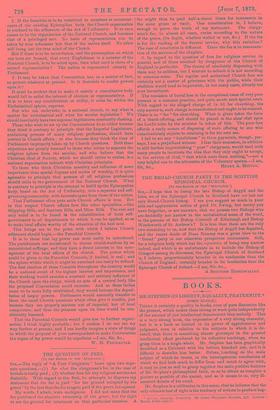THE QUESTION OF FEES.
[TO THE EDITOR OF THE "SPECTATOR."]
SIR,—The reply of "A Poor Clergyman" bears upon two sepa- rate questions,—(1) for what the clergyman's fee in the case of burials is really paid ; (2) whether fees for any religious service are desirable. With regard to the first, he attempts to disprove my statement that the fee is paid " for the ground occupied by the grave" by the fact that the fee is again paid if the grave is reopened.
My words, I admit, were ambiguous. I did not mean that the fee purchased the absolute ownership of the grave, but the right to use the ground for interment on that particular occasion. A fee might thus be paid half-a-dozen times for interments in the same grave or vault. One consideration is, I believe, enough to prove the truth of my statement. The clergy- man's fee, in almost all cases, varies according to the nature of the grave, (its depth, whether walled or not, &e.) If the fee is for the reading of the funeral service, why this variation ? The case of cemeteries is different. There the fee is in remunera- tion of the services of the chaplain.
2. In regard to the question of fees for religious service in general, and of those received by clergymen of the Church of England in particular. The theory of absolutely dispensing with them may be sublime, but I venture to submit it is not according to common-sense. The regular and authorised Church fees are certainly not a matter of grievance with the public, while their abolition would tend to impoverish, in too many cases, already too poor incumbents.
The remission of burial fees in the exceptional cases of very poor persons is a common practice, and quite meets such special cases. With regard to the alleged charge of ls. 6d. for churching, the only answer is, such charge is unauthorised and ought to be resisted. There is no " fee " for churching. What is given takes the form of a thank offering, and should be placed in the alma'-dish upon the Lord's table by the minister in token of this. The poor-box affords a ready means of disposing of such offering to one who conscientiously objects to retaining it for his own use.
I fail to see any " hatefulness " in these payments, though, per- haps, I am a prejudiced witness. I fear their remission, in addition to still further impoverishing " poor" clergymen, would tend with many people to inculcate the idea that they only ought to accept, in the service of God, " that which costs them nothing,"—not a very helpful one to the advocates of the Voluntary system.—I am,


































 Previous page
Previous page